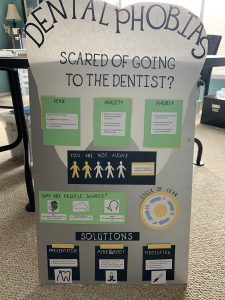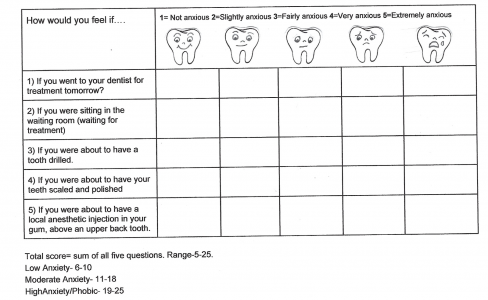Dental Phobia Presentation

Intro:
Dental fear, anxiety and phobias are a common issue in the dental office. Not only is this an issue for patients who need treatment it also leads to difficulties for health care professionals. Educating ourselves and identifying patients experiencing higher than normal anxiety towards treatment is important so we can navigate with them to ease discomfort and reverse fear and anxiety from developing further into phobia.
Fear: Fear is a common emotion we have all experienced at some point in our lives. Fear is often associated with first experiences causing nerves and anxiety when we are going into an unfamiliar situation due to fear of the unknown. Experiences and tasks often get easier as we repeat them however this isn’t always the case. Due to poor introduction and poor first experiences some individuals may experience anxiety or develop a phobia. This is why it is important for parents and dental professionals to make early childhood experiences related to oral hygiene positive and fun!
Anxiety: Dental anxiety could be considered a normal reaction to visiting the dentist as dental treatment tends to involve some degree of discomfort. Dental anxiety would be someone who has a heightened fear and is apprehensive and mildly nervous about certain aspects of dental treatment. While these patients may be uncomfortable treatment will still be manageable/tolerable.
The term anxiety is regularly interchanged with the term phobia even though they do not mean the same thing. Dental anxiety and dental fear are early signs of dental phobia.
Phobia:
excessive or unreasonable fear or anxiety with regard to the challenge or threat of dental examination and treatment
an irrational fear of a defined, generally non-dangerous situation which is avoided fully or endured with great distress
You are not alone.
2 out of 5 Canadians struggle with dental related fears.
While it may be more common among specific groups of individuals it is important to remember it can affect anyone despite what they may look like when they walk through the doors of the office.
Why are people scared?
We need to acknowledge that patients experiencing anxiety toward dental treatment could be experiencing not only fear of injections but could be triggered by other aspects of the dental clinic such as sounds of the drill, smell of anaesthetic chemicals and feelings of loss of control
There are many reasons why people are scared of going to the dentist. Some associate pain with the dentist due to the needles needed for anesthetic/numbing.
Fear of the unknown is also very common in a dental setting because they are doing procedures to your teeth and using tools that can be unfamiliar to you.
The smell of a dental office can be triggering for some because of the smell of the anesthetic/chemical/latex that hits your nose when you walk into the operatory. Although it may make you uneasy it is actually a sign that means the area is sterile.
Cycle of Fear
The cycle of fear is an example of how being fearful and not going to the dentist can result in a continuing issue.
dental fear causes you not to visit your dentist
delayed visiting results in poor oral hygiene practice
dental problems such as cavities, staining, infections become worse
symptom driven treatment; now instead of going for a regular check up/cleaning you then have to go for a filling or an extraction which can be a lot more uncomfortable or mentally traumatizing for the client resulting in increased dental fear- restarting the cycle.
Possible Solutions
Solutions for dental fears come in 3 forms; Preventative, Mind and body, and Medicated
efficient method of managing dental phobia would be to combine multiple methods of stress relief to reduce our patients anxieties and fears
Preventative: visiting the dentist/hygienist regularly to prevent more invasive/threatening treatment, using proper home technique and caring for your teeth regularly at home will aid in reduced dental interference.
Mind/Body: cognitive and behavioral techniques, breathing techniques, muscle relaxation, desensitization, distraction, hypnosis, yoga, massage therapy, acupuncture.
Some patients may already practice some of these techniques and will find them more efficient with practice.
Medicate: medication may not be necessary but should not be avoided as an option unless medical contraindications apply. Medications for anxiety, relaxation, numbing and pain management are available and should be discussed with your dentist and healthcare provider.
Dental Survey: A great tool for helping identify anxious patients and pinpoint specific fears are anxiety questionnaires. These questionnaires come in many different languages and have been proven to be very efficient in aiding dental professionals in identifying their patients specific fears and levels of anxiety. By identifying these specifics before beginning treatment we can have a better understanding on how to aid our patients through-out their time at our dental office.
We invite everyone who may be interested to take a modified dental survey for themselves or friends/family to self-evaluate your level of fear associated with dental appointments. We highly recommend if your score is above average to share this with your dentist to aid in making dental treatment a better experience.


